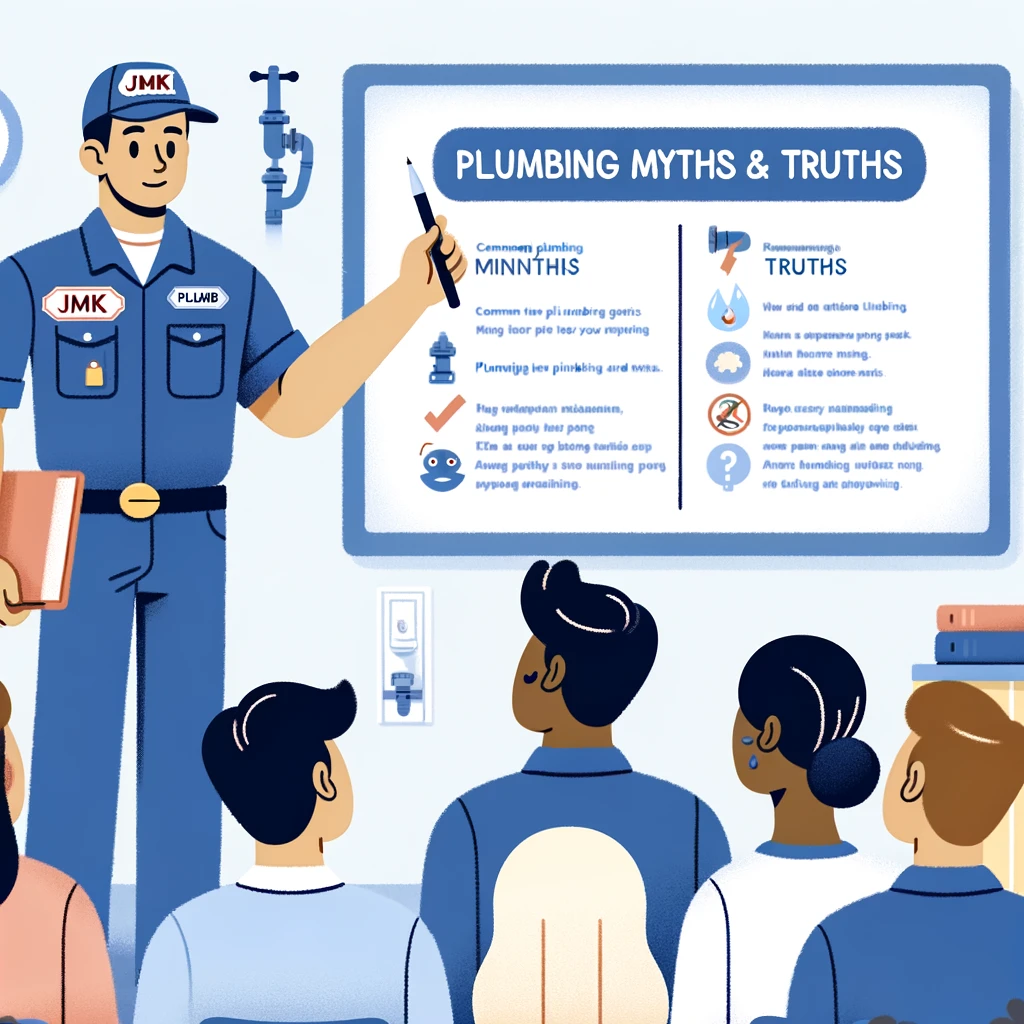Myth and Truth about Plumbing Every Homeowner Should Know

Understanding the ins and outs of plumbing can be daunting for any homeowner, given the abundance of information and common misconceptions circulating. At JMK Plumbing, we use our years of expertise to clarify these myth and arm you with knowledge. We aim to ensure that you make well-informed and beneficial decisions for your home’s plumbing health.
Key Takeaways
- Leaks Are Significant: Small leaks can lead to big problems and should not be ignored.
- Maintenance Is Crucial: Regular plumbing maintenance prevents costly repairs.
- Avoid Chemical Cleaners: Chemical drain cleaners can damage pipes; use mechanical methods instead.
- Be Mindful of Disposal: Don’t pour grease or non-biodegradable items down the drain.
- Ventilation Matters: Proper air flow is essential for plumbing efficiency.
- Hot Water Doesn’t Solve Grease: Hot water doesn’t prevent grease clogs; it just delays them.
- Small Leaks, Big Warnings: Minor leaks often indicate more serious underlying issues.
- Know Your DIY Limits: Some plumbing repairs require professional expertise.
Myth 1: A dripping faucet is merely an inconvenience.
It’s a widespread belief that a dripping faucet is nothing more than a trivial nuisance. However, the reality is quite contrary. Even the most minor drip can lead to a substantial waste of water over an extended period. This not only has detrimental effects on the environment but can also lead to a noticeable increase in your water bills. Furthermore, a dripping faucet often signals deeper plumbing issues that require immediate attention.
Firstly, embracing preventive maintenance is a smart move for any homeowner. This approach is invaluable in the realm of plumbing. Engaging in regular check-ups, cleaning operations for drains and pipes, and tackling minor repairs without delay can significantly enhance the longevity and efficiency of your plumbing system, warding off major setbacks.
Myth 2: Chemical drain cleaners are a go-to solution.
The allure of chemical drain cleaners as a quick-fix to blockages is misleading. These potent chemicals may offer a temporary solution but at the cost of potentially causing long-term damage to your plumbing by corroding pipes. Their adverse effects extend beyond the confines of your home, posing risks to both environmental well-being and human health.
Secondly, the humble plunger is often underestimated in its efficacy. It stands as a testament to simple, yet effective, tools in combating clogs, ensuring your pipes remain unharmed. Mastering the art of plunging can save you from reaching for harmful chemical alternatives.
Myth 3: Once down the drain, out of sight, out of mind.
A common misconception is that anything that makes its way down the drain is effectively dealt with. This notion couldn’t be further from the truth. Disposing of food remnants, grease, and non-degradable items through your drain can precipitate severe blockages and enduring issues within your plumbing infrastructure. It’s crucial to exercise discretion with what goes down your drains and opt for more sustainable disposal methods when feasible.
Thirdly, an often-overlooked aspect of plumbing is the necessity of air for optimal function. Air plays a pivotal role in maintaining the correct water pressure and facilitating smooth water flow through the pipes. Plumbing vents, protruding from roofs, are critical in introducing air into the plumbing system, highlighting the complex interplay between various plumbing components.
Myth 4: Hot water is an antidote to grease buildup.
The belief in hot water as a remedy for grease in pipes is a myth that needs dispelling. While it may offer a temporary solution by liquefying grease, this is a short-lived victory. As the water cools, the grease solidifies, often resulting in stubborn clogs. A preventative approach, avoiding grease disposal down the drain, is advised.
Furthermore, it’s essential to recognize that small leaks are harbingers of potentially larger plumbing issues. Neglecting these leaks can lead to a cascade of plumbing problems. These minor warnings are the plumbing system’s way of indicating underlying issues that, if unaddressed, could escalate into more significant concerns.
Myth 5: Plumbing repairs are suitable DIY projects.
The DIY approach, while suitable for minor fixes, is not advisable for more complex plumbing issues. Plumbing systems are intricate, and repairs often require specialized knowledge and tools. Diving into complex repairs without the requisite expertise can result in costly mistakes and further damage.
Conclusion
At JMK Plumbing, our mission is to enlighten and serve our community by providing expert plumbing services and reliable information. Demystifying common plumbing myths enables homeowners to make knowledgeable decisions about their plumbing needs. We encourage you to reach out to us with any plumbing concerns or questions. Your home’s plumbing integrity is our top priority, and we are here to ensure it is maintained to the highest standards.